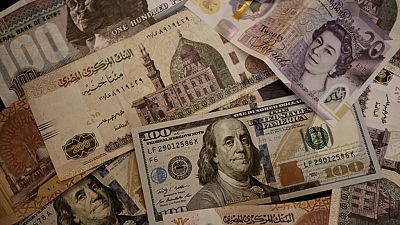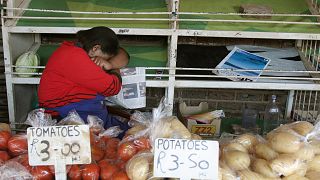Egypt
Egypt's pound dropped to a record low on Wednesday, declining over five percent against the US dollar.
Egypt devalued the pound in October but it's not let it float freely against the US dollar - which is a condition of IMF loans.
In any case the new three billion dollars IMF loan does not significantly help - Egpyt's debt servicing alone for 2022-2023 amounts to 42 billion dollars.
So far Egypt has devalued the pound by 57 percent, but it remains one of the five countries most at risk of not repaying its external debt according to Moody's.
There are now limits to how much Egyptians can take out of the bank and shoppers are struggling.
Officially inflation has reached 18.7 percent, but "the bread I used to buy for one pound is now for three," Rehab, 34, told AFP.
"My husband earns 6,000 pounds per month" (230 euros), before we lasted 30 days with that, today we go into the red after ten," she added.
With the majority of goods imported and an eight percent jump in interest rates, everything is expensive. And that includes bread patties, falafels, bottles of oil and vegetable packets that remain at subsidised prices for the 70 million Egyptians classified as "poor" and therefore holders of a ration card.
At the supermarket, signs warn: "maximum three bags of rice", "no more than two bottles of milk" or "one bottle of oil".
In the newspapers, the National Food Council praised "chicken feet, beneficial for the body and the wallet".
"Frozen meat is "no longer an option," said shopper Rida, 55, who also refuses to give her name. "It has gone from 85 to 150 pounds per kilo." Fresh meat is out the question, it is double the price of frozen meat.
Rida struggles to feed her family of 13 people: "I am a civil servant and I do cleaning in a hospital, but even with two salaries there are plenty of things that I can no longer buy," she told the AFP.
If prices are soaring, it is also because importers are struggling to release dollars: currently, seven billion dollars of products are blocked in ports, according to the authorities.
Several banks are now limiting withdrawals in dollars and have tripled the costs of using bank card while at money changers. They were scalded by a haemorrhaging of dollars at the beginning of the war in Ukraine, when investors took out billions of them.
Even the very pro-regime Amr Adib got angry in his talk show: "At least let the Egyptians on vacation withdraw money for their taxi back!"
The Bank of Egypt has only 33.5 billion dollars in reserve against 41 billion back in February - including 28 billion in the form of deposits from Gulf allies. And its external debt has more than tripled in 10 years to 150 billion euros.
The Minister of Transport has proposed a solution: make tourists pay for the train in dollars.
"I need dollars to pay for imported trains. It suits tourists and me too," Kamel al-Wazir explained recently.
But to release more money, the state wants to privatise as much as it can - so much so that public opinion is worried that Egypt will lose its sovereignty over its jewel asset, the Suez Canal.
It is "not for sale" President Abdel Fattah al-Sissi has insisted.
For Stephan Roll, of the German Institute for International and Security Affairs, Egypt is going into debt to "consolidate (its) authoritarian regime."
"The army, on which Mr. Sissi relies, is the first beneficiary: external debt protects his income and his property and finances mega-projects since most of the major works are entrusted to military engineers," he adds.














02:09
In a bid to aid its economy, Lebanon hopes to return to golden age of tourism
01:09
Egypt: Inflation forecast to have climbed further in May
01:08
OECD revises forecast, projects slowdown in global economic growth
Go to video
Libya devalues currency for first time in four years amid fiscal strain
Go to video
Muslims in Cairo stock up on provisions for Ramadan
01:49
January sees Egypt's inflation Fall to 23.0% due to base effect